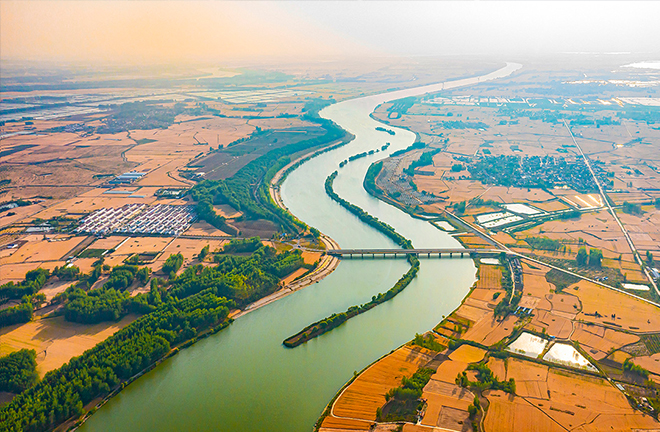Fieldwork in real life and in literature complement each other

The vast expanse of fields beside the Huai River which flows through Suqian City, Jiangsu Province Photo: Zhang Lianhua/CNS
As a research method, fieldwork (also known as field investigation) has a long history of practice in social science fields such as ethnology, sociology, anthropology, and folkloristics. Deepening criticism and reflections related with fieldwork also arise over time. In fact, fieldwork exists not only in reality, but also in literature.
Fieldwork in reality
Fieldwork is an exploration of unknown groups of people and the unknown world. It comes from a curiosity about different human cultures, and it seeks to obtain a holistic understanding of the development of human society. Out of this purpose, fieldwork originally focused on those once seen as “uncivilized” and “barbaric” groups of people as the research objects.
In early fieldwork practices in China, the word “field” denoted villages and remote borderlands and analyzed these as counterparts of cities. Fieldwork thus became an essential research tool that was used to obtain deeper understandings of rural and border areas and was inextricably connected with the two types of areas.
When people talk about field investigation, especially in cases outside academia, what flashes into their minds is a rural scene of fields that extend into the distance, small bridges with streams flowing underneath, or the afterglow of the setting sun above a long river. Fieldwork is also often mistaken for tourism or taking a trip in the countryside, yet with exotic elements to it. In fact, this stereotypical impression has been criticized and corrected by many people. Today, however, there are still many amateurs who understand fieldwork with these narrow visions.
In fact, as an effective means and method to understand and study humans and their activities, the scope within which fieldwork is conducted is always changing, and keeps pace with the times with continuous innovation. With increasing social development and updated research objects which adapt to shifting reality, fieldwork has extended beyond the previously outmoded scope of the countryside or borderlands.
In this sense, field denotes a variety of domains through which academia understands the practice of people’s production and life. The field can be big or small—as small as a room, a courtyard, an ancestral temple, a building, a village, a settlement, a township, or as big as a river basin, a region, and so on. The field can be a rural society or an urban community. The object of fieldwork can be not only a person’s activity, but also the activities of a group of people. In short, the field is the spatial scope of where people’s activities are conducted. As long as there are people, there are fields. It is no exaggeration to say that in real life, fields are found everywhere.
Fieldwork in literature
The field can be found anywhere in real life, but it does not mean that fields only exist in real life. As the ancient Chinese saying goes, knowledge comes from reading as many as ten thousand books and traveling as much as ten thousand miles. This sentence has clearly articulated the two fundamental ways of learning and research: one is traveling, which corresponds to physical fieldwork. It understands people’s production, life, and social significance by conducting on-site field surveys. The other path is knowledge accumulation from books, which corresponds to field studies in literature.
The latter makes sense because literature itself is to some extent the recordings of people’s various activities. Literature can be an important carrier to understand human activities, and a medium through which human civilization is transmitted and inherited from generation to generation. Therefore, literature also exhibits the nature of being a “field.” From this point of view, fields exist not only in real life, but also in various types of literature.
Complementarity
However, conducting fieldwork in literature differs from physically conducting it. Physical fieldwork is conducted mainly through observation and conducting in-depth interviews to obtain pertinent information, while fieldwork in literature is mainly conducted through reading texts and analysis in order to deepen understandings.
Although the two differ in their specific research methods, they have similarities in their grasp of the essential meaning of the “field.” Whether in real life or in literature, the field is essentially a domain that understands and analyzes people’s activities. In terms of this, the two are consistent with each other.
Conducting fieldwork in reality and that in literature are not contradictory and do not conflict one another. They can be complementary and mutually beneficial. The physical fieldwork can provide us with all kinds of fresh and rich background information about human activities but lacks sufficient grasp of diachronic features. However, fieldwork through literature analysis can provide diachronic clues for us to understand the origins and evolution of human activities, but complex factors such as environmental backgrounds behind these activities are often neglected. By drawing experience from both types of fieldwork and utilizing the advantages of each, we will often have unexpected success in understanding related issues.
If literature reviews place greater emphasis on examining the time sequence of historical events, physical fieldwork bolsters the spatiality of events. Only by combining past historical events with current practices in social life, can the development logic of regional social history be better understood.
Long Sheng is a professor from the Advanced Institute for Confucian Studies at Shandong University.
Edited by BAI LE
